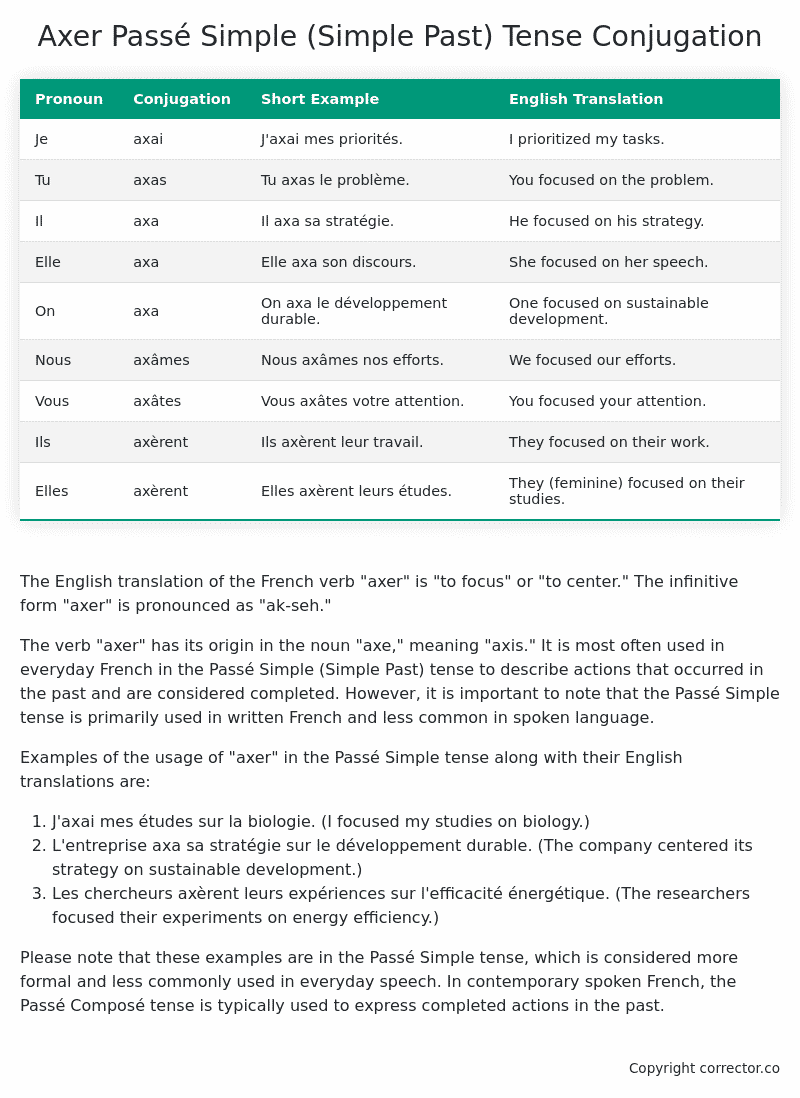Passé Simple (Simple Past) Tense Conjugation of the French Verb axer
Introduction to the verb axer
The English translation of the French verb “axer” is “to focus” or “to center.” The infinitive form “axer” is pronounced as “ak-seh.”
The verb “axer” has its origin in the noun “axe,” meaning “axis.” It is most often used in everyday French in the Passé Simple (Simple Past) tense to describe actions that occurred in the past and are considered completed. However, it is important to note that the Passé Simple tense is primarily used in written French and less common in spoken language.
Examples of the usage of “axer” in the Passé Simple tense along with their English translations are:
- J’axai mes études sur la biologie. (I focused my studies on biology.)
- L’entreprise axa sa stratégie sur le développement durable. (The company centered its strategy on sustainable development.)
- Les chercheurs axèrent leurs expériences sur l’efficacité énergétique. (The researchers focused their experiments on energy efficiency.)
Please note that these examples are in the Passé Simple tense, which is considered more formal and less commonly used in everyday speech. In contemporary spoken French, the Passé Composé tense is typically used to express completed actions in the past.
Table of the Passé Simple (Simple Past) Tense Conjugation of axer
| Pronoun | Conjugation | Short Example | English Translation |
|---|---|---|---|
| Je | axai | J’axai mes priorités. | I prioritized my tasks. |
| Tu | axas | Tu axas le problème. | You focused on the problem. |
| Il | axa | Il axa sa stratégie. | He focused on his strategy. |
| Elle | axa | Elle axa son discours. | She focused on her speech. |
| On | axa | On axa le développement durable. | One focused on sustainable development. |
| Nous | axâmes | Nous axâmes nos efforts. | We focused our efforts. |
| Vous | axâtes | Vous axâtes votre attention. | You focused your attention. |
| Ils | axèrent | Ils axèrent leur travail. | They focused on their work. |
| Elles | axèrent | Elles axèrent leurs études. | They (feminine) focused on their studies. |
Other Conjugations for Axer.
Le Present (Present Tense) Conjugation of the French Verb axer
Imparfait (Imperfect) Tense Conjugation of the French Verb axer
Passé Simple (Simple Past) Tense Conjugation of the French Verb axer (You’re reading it right now!)
Passé Composé (Present Perfect) Tense Conjugation of the French Verb axer
Futur Simple (Simple Future) Tense Conjugation of the French Verb axer
Futur Proche (Near Future) Tense Conjugation of the French Verb axer
Plus-que-parfait (Pluperfect) Tense Conjugation of the French Verb axer
Passé Antérieur (Past Anterior) Tense Conjugation of the French Verb axer
Futur Antérieur (Future Anterior) Tense Conjugation of the French Verb axer
Subjonctif Présent (Subjunctive Present) Tense Conjugation of the French Verb axer
Subjonctif Passé (Subjunctive Past) Tense Conjugation of the French Verb axer
Subjonctif Imparfait (Subjunctive Imperfect) Tense Conjugation of the French Verb axer
Subjonctif Plus-que-parfait (Subjunctive Pluperfect) Tense Conjugation of the French Verb axer
Conditionnel Présent (Conditional Present) Tense Conjugation of the French Verb axer
Conditionnel Passé (Conditional Past) Tense Conjugation of the French Verb axer
Conditionnel Passé II (Conditional Past II) Tense Conjugation of the French Verb axer
L’impératif Présent (Imperative Present) Tense Conjugation of the French Verb axer
L’impératif Passé (Imperative Past) Tense Conjugation of the French Verb axer
L’infinitif Présent (Infinitive Present) Tense Conjugation of the French Verb axer
L’infinitif Passé (Infinitive Past) Tense Conjugation of the French Verb axer
Le Participe Présent (Present Participle) Tense Conjugation of the French Verb axer
Le Participe Passé (Past Participle) Tense Conjugation of the French Verb axer
Struggling with French verbs or the language in general? Why not use our free French Grammar Checker – no registration required!
Get a FREE Download Study Sheet of this Conjugation 🔥
Simply right click the image below, click “save image” and get your free reference for the axer Passé Simple tense conjugation!

Axer – About the French Passé Simple (Simple Past) Tense
Formation
Usage
Narration
Historical Context
Interactions with other tenses
Passé Composé
Imparfait
Conditional and Subjunctive
Summary
I hope you enjoyed this article on the verb axer. Still in a learning mood? Check out another TOTALLY random French verb conjugation!


